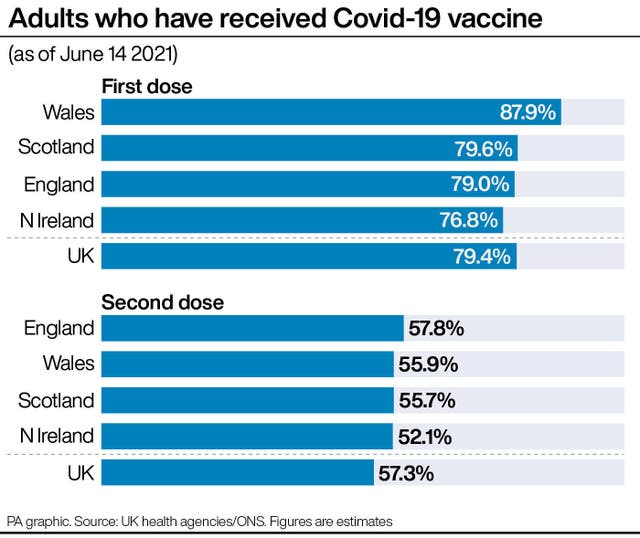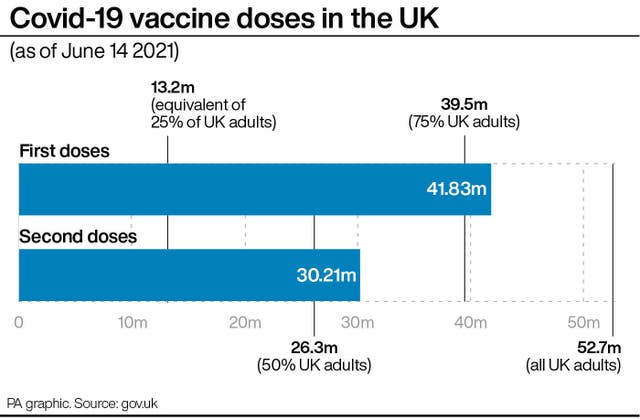Boris Johnson faces the prospect of a Tory rebellion when MPs are asked to approve the extension of coronavirus restrictions in England until July 19.
The House of Commons will vote on Wednesday evening on the four-week delay to the end of lockdown measures, aimed at buying more time for the vaccine programme.
Labour has signalled it will back the extension so the Prime Minister should be spared a defeat, but Conservative lockdown-sceptics are likely to express their anger during a debate.
Scientific advisers have said the delay is necessary to prevent a fresh spike in hospital admissions due to the rapidly spreading Delta variant first identified in India.
Senior Cabinet minister Michael Gove has said it would take something “unprecedented and remarkable” for restrictions to be extended any further than July 19.
But in a sign that Cabinet ministers have concerns about the extension, Commons leader Jacob Rees-Mogg told his ConservativeHome podcast: “You can’t run society just to stop the hospitals being full, otherwise you’d never let us get in our cars and drive anywhere or do any of the other things that people want to do, so there has to be some proportionality.”
International Trade Secretary Liz Truss told Sky News: “Jacob has his views and those are his views.
“But what I’m telling you is the reason we are doing this, the reason we are taking these measures is to protect lives, and that’s what’s important.”
Mr Johnson will face Sir Keir Starmer at Prime Minister’s Questions, but it will be Health Secretary Matt Hancock who will open the debate on extending the restrictions.

Delays are also expected to hit Scotland after First Minister Nicola Sturgeon said the mainland’s move to the lowest level of restrictions will “likely” be delayed by three weeks.
The latest figures show 1,136 patients with Covid-19 were in hospital in the UK on June 13, an 18% rise from the previous week and the highest number since May 7.
Leaders in the hospitality sector have said they are “bitterly disappointed” by the delay and called for a postponement to the reintroduction of business rates payments to support struggling firms.
Meanwhile, reports suggested ministers will soon announce they will change the law to make vaccines mandatory for care home staff over concerns about take-up.
Officials at the Department of Health and Social Care (DHSC) did not deny a report by the Guardian saying ministers will approve the measure for social care workers in England.
Under the plans, staff working with adults will be given 16 weeks to get vaccinated or face losing their jobs, according to the newspaper.
#COVID19 VACCINE UPDATE: Daily figures on the total number of COVID-19 vaccine doses that have been given in the UK.
As of 15 June, 72,040,763 COVID-19 vaccine doses have been given in the UK.
Visit the @PHE_uk dashboard for more info:▶️ https://t.co/cQkuLQglz1 pic.twitter.com/bizxZldveD
— Department of Health and Social Care (@DHSCgovuk) June 15, 2021
NHS England chief executive Sir Simon Stevens has said that all over-18s should be able to apply for a vaccine “by the end of this week”.
But a possible rift appears to have formed between the Joint Committee on Vaccination and Immunisations (JCVI) and ministers over the vaccination of younger people.
The Telegraph reported the JCVI will recommend against the vaccination of under 18s in an “interim” statement until more data can be obtained on the risks.
However, a senior Government source pointed towards an earlier decision from the Medicines and Healthcare products Regulatory Agency (MHRA) and the approach in other nations.
“The Pfizer vaccine has been licensed for 12-15 year olds by the MHRA and a number of countries will be vaccinating children in those age groups,” the source said.
“Ministers have not received advice and no decisions have been taken.”

Local leaders in England have raised concerns over possible shortages of the Pfizer vaccine in their areas and concerns of a delay to the roll-out of jabs.
Ian Ward, leader of Birmingham City Council, told the Telegraph that unless the Government can deliver Pfizer or Moderna vaccines “in the right numbers”, it is “hard to see how we can safely unlock on July 19” adding “that goes for the whole country”.
Last week, vaccines minister Nadhim Zahawi admitted Pfizer/BioNTech vaccine supplies will be “tight” over the next few weeks, but said he was confident of offering every adult a first dose by the end of July.
That target has now changed, with the Government announcing on Monday the target has been brought forward to July 19.
A Department of Health and Social Care spokeswoman insisted there are “no shortages” of vaccines and that “deliveries are coming in on time and as ordered”.




Comments: Our rules
We want our comments to be a lively and valuable part of our community - a place where readers can debate and engage with the most important local issues. The ability to comment on our stories is a privilege, not a right, however, and that privilege may be withdrawn if it is abused or misused.
Please report any comments that break our rules.
Read the rules hereLast Updated:
Report this comment Cancel